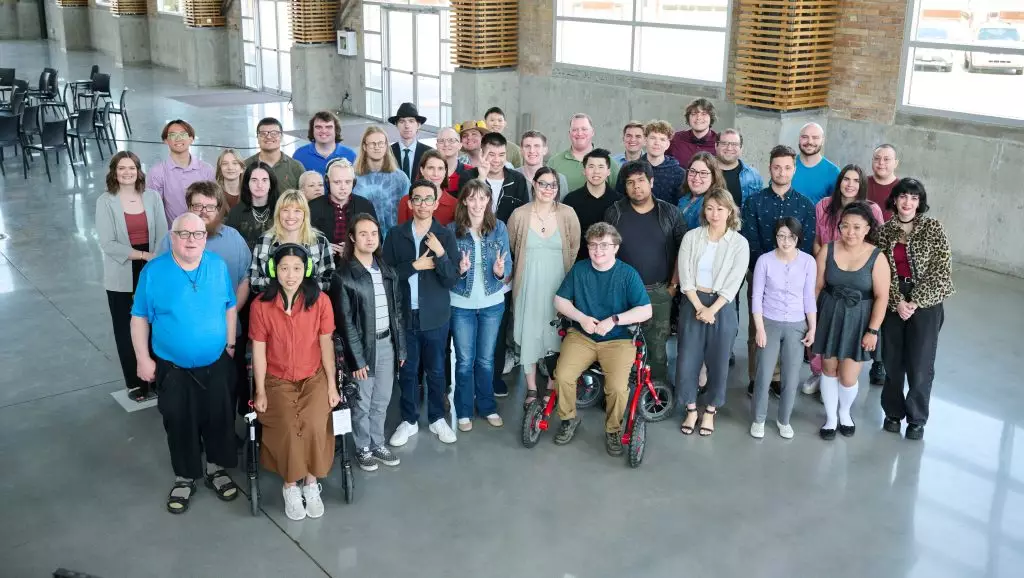The recent announcement from Canada’s CBC regarding the commissioning of “The Assembly” is a breath of fresh air in a media environment often criticized for its formulaic approach. The show, set to premiere in the 2025/26 season, showcases a groundbreaking format that features celebrities being interviewed by a panel of 30 unique individuals—all on the autism spectrum. This innovative style combines entertainment with a deeper discourse about representation, making it a significant contribution to contemporary television.
What sets “The Assembly” apart is its root in the French series, “Les Rencontres du Papotin,” which has successfully navigated the complexities of communication and connection through a lens of authenticity. The adaptation retains the essence of open dialogue, while contextualizing it within the Canadian cultural landscape. Celebrities such as Jann Arden, Howie Mandel, and Maitreyi Ramakrishnan bring star power, but the true value lies in the diverse perspectives of the interview panel, helping to elevate both the interview format and the representation of neurodiverse individuals in media.
Celebrity Meets Unconventional Interviewing
Engaging with atypical interviewers fundamentally flips the script on traditional celebrity interviews. Typically, fans and viewers are accustomed to the polished and rehearsed exchanges that often lack depth. However, “The Assembly” encourages spontaneity and genuine human interaction, creating a platform where celebrities can demonstrate vulnerability and relatability. This is a remarkable move towards normalizing conversations around mental health and neurodiversity, areas long overshadowed by stigma.
The assembly of interviewers coming from an autistic background invites an honest conversation, devoid of the usual noise that surrounds celebrity culture. It provides a space for a nuanced understanding of different life experiences, fostering empathy and dialogue between the viewers and the celebrities they admire. Instead of one-sided admiration, audiences will likely resonate with the authentic expressions that arise when conventional barriers are lifted.
Fostering Community Connections Through Storytelling
In addition to “The Assembly,” CBC set the tone for community-focused storytelling by also greenlighting other innovative formats. “Locals Welcome,” hosted by renowned food writer Suresh Doss, aims to shine a light on hidden culinary gems across Canada. By emphasizing the lesser-known aspects of Canada’s food culture, CBC illustrates a commitment to elevating local voices and narratives. This food-centric approach not only celebrates diversity within the country but also acts as a counter-narrative to mainstream culinary programming, which often prioritizes sensationalism over authenticity.
Meanwhile, shows like “Must Love Dogs,” which follows CFL All-Star Brady Oliveira and realtor Alex Blumberg as they rescue dogs, infuse heartwarming narratives into the Canadian television landscape. The collaboration between sports, community service, and the emotional depths of pet advocacy opens new avenues for storytelling that are rich in implications, showcasing the interconnectivity of diverse lives and pursuits.
Preserving Diversity in Programming
CBC’s strategic move to renew its drama and comedy offerings—such as “Murdoch Mysteries,” “Heartland,” and “Just For Laughs”—illustrates a balanced approach where traditional programming coexists with new and challenging content. The renewed interest in veteran series speaks to their established viewer base and the cultural fabric of Canada, while the introduction of original concepts reflects a desire to evolve and adapt to contemporary societal narratives.
The network’s acquisition of international titles also indicates an openness to broaden viewers’ horizons. Series like “Rise of the Ravens,” rooted in historical conflicts, juxtapose the melodrama of Canadian narratives with global stories, fostering broader understanding and appreciation of the world beyond its borders.
A Vision for the Future of Canadian Broadcasting
Barbara Williams, CBC’s Executive Vice-President, articulates a vision that positions the network as a steadfast cultural cornerstone in Canadian society. The acknowledgment of its historical role within the community—and the necessity of its evolution in the face of changing times—highlights an urgent call for relevance and innovation in public broadcasting.
As programs like “The Assembly” promise to reshape interviews by fostering genuine connections, CBC indicates a prioritization of authenticity. This dedication to recalibrating representation in media is not merely an improvement in programming; it encapsulates a broader commitment to inclusivity and diversity—a needed transformation in today’s complex social fabric.
